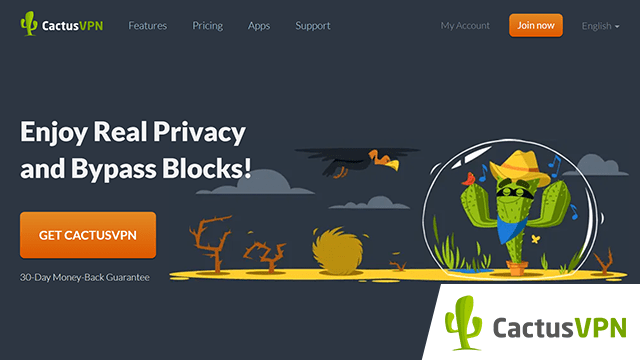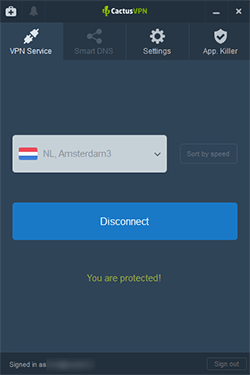CactusVPN Review (2024): Simple, No-Nonsense Provider
CactusVPN has been on the market since 2011. It was founded by three friends whose goal is to safeguard privacy and safety for those who want to be better protected online. CactusVPN is run like a family company, which is reflected in its personalized approach.
The provider’s headquarters are located in Canada, which is part of the 5-eyes alliance. You might wonder whether this affects your privacy in any way. What encryption protocols does CactusVPN use? And can you watch Netflix or download torrents?
In this review, we give you all the answers.
CactusVPN Short Review
| Pros | Cons |
|---|---|
| Decent speed on servers | Smart DNS service and VPN operate separately |
| User-friendly software | Very few servers |
| Good customer service | Pretty pricey |
| Torrents and Netflix USA work | |
| Anonymous payment is possible | |
| “App. Killer” for when VPN connection drops |

In general, CactusVPN is characterized by user-friendly software and simple functionality. It’s possible to pay for a subscription anonymously. In terms of logging policy, however, they can’t be considered a no-log service in the strictest sense.
We were surprised by certain choices, such as a separation in settings between the VPN and Smart DNS service. Additionally, the CactusVPN server network is pretty small and the servers aren’t exactly fast. It’s also not your cheapest option for a VPN. Generally, though, the service does what it’s supposed to do.
Overall, we give CactusVPN a score of 6.9 out of 10.
| 💵 Price |
From $3,95 a month |
| 📱 Operating systems | Windows, Mac, iOS, Android, Linux |
| 💻 Connections | Unlimited |
| 💳 Payment methods | PayPal, Other, Credit card, Cryptocurrency |
| 🔒 Protocols | OpenVPN, IKEv2, SSTP, WireGuard, L2TP/IPsec, PPTP |
| 📥 Torrent options | Torrenting allowed |
| 📅 Money-back guarantee | Money-back guarantee, 30 Days |
| 📋 Logs | Connection Logs |
| 🎬 Works with |
|
Speed – How Fast is CactusVPN?

Speed is an essential element of a good VPN. Without enough speed, you won’t be able to enjoy browsing the internet or streaming movies.
When it comes to speed, we give CactusVPN a score of 6.5 out of 10. This is based on the following conclusions:
- Speed results are decent, but less impressive than we hoped.
- Connection speed during daily use is good.
- There were no problems during streaming, gaming, or downloading.
Speed test results CactusVPN
When we did our review of the fastest VPN providers, CactusVPN came in at #1 for local servers. Unfortunately, our current tests don’t seem to comply with those results.
| Server | Download (MBPS) | % Download | Upload (MBPS) | % Upload | Ping (MS) |
|---|---|---|---|---|---|
| No VPN | 288.95 | 100% | 28.73 | 100% | 14 |
| The Netherlands | 81.19 | 28.1% | 27.33 | 95.1% | 16 |
| US (Chicago) | 29.65 | 10.3% | 7.54 | 26.1% | 124 |
As you can see, we’ve run CactusVPN through different servers to assess its speed. To create a benchmark, we first looked at speed without using a VPN. Then, connecting through CactusVPN, we checked speed for a local server in the Netherlands as well as a distant server in the United States.
The results in the table above are less impressive than our previous speed test. For the local server, download speed dropped to a meager 28.1%. While this might not affect daily use, depending on your bandwidth, it’s a significant difference. For the distant server, the results are even worse.
Even so, users might not notice this during daily use. Let’s have a look.
Speed during daily use
A VPN should do its job without interfering too much in your regular online activity. That’s why we’ve tested CactusVPN for daily use: browsing, streaming Netflix, downloading torrents, and playing some online games.
Browsing the web, we didn’t notice CactusVPN running in the background at all. While watching YouTube, checking our email, using online text processors, and visiting websites, speed didn’t slow down in any significant way.
The only issue we ran into was that we had to enter a CAPTCHA here and there to visit certain sites. If this happens, it’s likely because you’re using an unknown or “suspicious” IP address that has been used by many different accounts. This happens with some of the best VPNs.
Streaming Netflix and downloading torrents were no problem, especially when connected to a local server. Even relatively large files were downloaded quickly — which was a surprise, considering our speed tests.
For gaming, both the server in the Netherlands as well as the one in the United States gave us access to our favorite online FPS games. We didn’t experience any issues or delays.
Safety – How Secure is CactusVPN?

To assess CactusVPN’s safety features, we took a look at protocols, the provider’s privacy and logging policy, and the personal information required to create an account. Overall, CactusVPN scores a 7.0 out of 10 for safety.
Looking at their features, we can conclude the following:
- CactusVPN offers a variety of different protocols, including OpenVPN and IKEv2.
- The service uses strong AES-256 encryption.
- CactusVPN claims to have a strict no-log policy, but the terms of service contradict this: CactusVPN keeps track of quite a lot of personal data.
- This VPN has its own kill switch called App. Killer, which you can set up to your preferences.
- To create an account, you need an email address and a password. Payment is possible with cryptocurrency.
Protocols
When using CactusVPN, you can choose from a variety of encryption protocols, including OpenVPN, SSTP, L2TP, PPTP, IKEv2, and WireGuard. If you choose OpenVPN, you can pick between TCP and UDP.
This is a wide range of VPN protocols. We suggest you use the OpenVPN protocol. It’s a secure protocol that works on all major operating systems (Windows, macOS, Android, iOS, and Linux).
For certain protocols, CactusVPN only allows one connection per subscription per server. This is the case for PPTP, L2TP, IKEv2, and WireGuard. You can still use these protocols on multiple devices, but you have to make sure they’re not connected to the same server at once. With the other protocols, this is not an issue.
For most of its VPN protocols, CactusVPN uses AES-256 encryption. This is a very secure type of encryption (military-grade) that certainly keeps your online activity safe.
Logging and privacy
CactusVPN is located in Canada, which is part of the 5-eyes alliance. The countries that are part of this coalition exchange communications data amongst each other through mass surveillance of their populations. CactusVPN claims they have a strict no-log policy, but the language in the terms of service is notably vague, which worries us.
The VPN service states that they have the authority to block certain web pages or applications to “protect other users, to comply with legal restrictions or to minimize the threat or legal action against us and our users.” They also have the right to impose bandwidth restrictions “if the service of other users is disrupted due to your excess usage.” For both these purposes, they’d have to keep logs, otherwise they wouldn’t be able to see that you’re visiting certain pages or using an excessive amount of data.
Additionally, as part of fraud detection measures, CactusVPN also stores some anonymous data. This refers to the IP and host you used the last time you signed into the CactusVPN website, as well as some system logs for troubleshooting.
After contacting customer service about our concerns, CactusVPN informed us that they have no insight into your data whatsoever. They promised to adapt their privacy statement in response to our question. However, as of now, this has yet to be changed.
Kill switch
Though CactusVPN doesn’t offer a kill switch, their App. Killer feature allows you to shut down certain domains or applications the moment your VPN connection fails. This means your data will remain safe and your actual IP address hidden, even when you’re not connected anymore. In a way, it has the same purpose as a kill switch, it just gives you the opportunity to choose what does and doesn’t automatically get shut down.
You can activate the App. Killer under the dedicated tab in the CactusVPN interface.
What information does CactusVPN need?
If you want to create a CactusVPN account, you need to enter an email address and a method of payment. You can pay in various ways, including with cryptocurrency. This means you can stay very anonymous when creating a CactusVPN account, especially if you use an anonymous email address only created for the purpose of buying a subscription.
When you pay by credit card, however, CactusVPN collects your email address, country, province (only in Canada), city, address, postal code, and part of your credit card info.
Usability – How User-Friendly is CactusVPN?

In terms of appearance, CactusVPN is similar to bigger, well-known VPN providers such as CyberGhost and IPVanish. In general, nowadays, the software of many VPN providers is quite similar. Most have a high standard for user-friendliness, and CactusVPN isn’t any different. We gave them an 8.0 out of 10 for user-friendliness.
This is based on the following things:
- The CactusVPN installation process is very straightforward.
- All options and features are easily located in the software.
- CactusVPN’s software has a “sort-by-speed” option that ranks servers based on their speed.
- Subscriptions offer DNS and VPN separately, meaning you need to activate Smart DNS manually. This is unusual.
- Customer service is helpful, but somewhat cumbersome.
CactusVPN website and installation process
The CactusVPN website is well-organized and easy to navigate. The menu bar at the top speaks for itself. Besides English, it’s possible to view the website in French, German, Portuguese, Russian, Spanish, and Turkish.
You can access your account page by logging into the CactusVPN website. This is a more extensive page in comparison to most other providers. Once you’re logged in, CactusVPN offers different tabs on the left side of the screen, rather than lumping all information together. This makes it easy to find what you need.

The CactusVPN installation process is very straightforward. You can use this VPN on all kinds of devices (Windows, Android, macOS, iOS, Android TV, and Amazon Fire TV) as well as with multiple browsers (Chrome and Firefox).

On a tablet or smartphone, you can simply download the app from the app store, then create an account and log in. Switch the VPN on in the app, and you’re ready to go online.
Installing CactusVPN on mac and PC takes a bit more effort, but doesn’t last long, either. Here’s a step-by-step guide to install CactusVPN:
- On the CactusVPN website, click “Get CactusVPN” to see the different plans.
- To create an account, choose the subscription that is right for you.
- Select your payment method and enter your payment details. You can use an anonymous email address or pay with cryptocurrency if you like.
- After your account is activated, you can log into your account on the website.
- Navigate to the “How to Start” tab on your account page and follow the steps for the right software.
- Install the downloaded file.
- Open the CactusVPN software and log in using your account information.
- Pick the server you want. If you’re looking for the fastest server, you can sort CactusVPN’s servers by speed and pick the best one.
- Switch the VPN on: you’re ready to go online.
CactusVPN allows an unlimited amount of devices to be connected through your account simultaneously, so we recommend you download the app to all of your devices (whether it be a laptop, tablet, smartphone, or smart TV) to protect all of your online traffic.
CactusVPN appearance and ease-of-use
CactusVPN’s software is well-organized and looks quite similar to CyberGhost. Features are sorted under four different tabs: VPN Service, Smart DNS, Settings, and App. Killer.

Under the “VPN Service” tab, you can select a server to connect to, sort all servers from fastest to slowest (use the “sort-by-speed” button), and connect to your chosen server.
The “Smart DNS” tab allows you to unblock selected content. Their Smart DNS service is included in each subscription plan, but you manually have to activate it in the app. Since it’s difficult to unblock websites without the use of Smart DNS, we definitely recommend you do this.
“Settings” gives you some options to manually set the VPN software. You can select the VPN protocol of your choice, decide which region you want to apply the DNS server to, and manage some standard settings.
Under “App. Killer,” you can activate CactusVPN’s version of a kill switch. This will block all data traffic in case your VPN connection drops.
Pricing and payment methods
CactusVPN is not the cheapest option for a VPN. A one-month subscription costs $9,99 per month. A three-month subscription will cost you $7,99 per month. If you want to subscribe for a year, you will pay $5,83 per month, and if you want to get an account for two years, you’re paying $3,95 a month.

Each subscription plan offers a 30-day money-back guarantee, which gives you the chance to see if CactusVPN is really for you. This guarantee is conditional, however. If you wish to unblock a website that’s not listed on the CactusVPN “Smart DNS” list, you won’t be able to get your money back. The same goes for general failure to comply with the terms of service, or if you run into trouble trying to get CactusVPN to work on a device or operating system the VPN is not compatible with.
You can pay for your subscription using any of the following methods:
- PayPal
- Credit card (Visa, MasterCard, Discover, American Express)
- Bitcoin & Altcoins
- Webmoney
- Union Pay
- Alipay
- Local payment options (Przelewy24, iDeal, Boleto Bancario, etc.)
Customer service
CactusVPN’s customer service seems a bit reserved. While they do have a support chat, an employee informed us via email that this live chat is not available 24/7. Since CactusVPN’s headquarters are located in Montréal, Canada, we assume the live chat is primarily active during Eastern Standard Time working hours (UTC-5).
When you navigate to “Support” on the website, several options pop up, including guidelines for installation, an FAQ, a “Learning Center,” and information about starting the VPN. It’s also possible to submit a “Support Ticket,” which will be answered via email. CactusVPN does recommend you try to find the answer to your question on the website first.
To assess customer service, we sent CactusVPN an email with a couple of questions. We received a response within the hour. Answers were a bit short, but definitely useful.
Since the website does not offer a general search option, it would be useful if a 24/7 live chat was available to provide a quick response. The website offers a lot of information, but it can take some time to find it. On the plus side, interaction with customer service via email helped us along quite quickly.
Server Network CactusVPN

Compared to other VPN providers, CactusVPN does not have the biggest server network. Especially not in comparison to a VPN provider like Private Internet Access, which has over 33.000 servers. If you’re looking for a VPN to unblock foreign Netflix libraries, CactusVPN doesn’t give you many options. For these reasons, we gave them a score of 6 out of 10 for their server network.
We drew the following conclusions:
- CactusVPN has a small server network: 38 servers in 22 countries.
- CactusVPN has no VPN servers in Africa, and – with the exception of Brazil – none in South America.
- There are special torrent servers located in Germany, Latvia, Malaysia, the Netherlands, Romania, Spain, and Switzerland.
- CactusVPN does not offer dedicated IP addresses.
Number of servers and locations
CactusVPN has a small server network, consisting of 38 VPN servers in 22 locations. These locations are spread out over 22 countries across three regions: the Americas, Europe, and Asia-Pacific.
| Country | Location |
|---|---|
| Australia | Sydney |
| Brazil | Franca |
| Canada | Montréal (2 servers) |
| France | Paris |
| Germany | Nuremberg (P2P) |
| Hong Kong | Hong Kong |
| India | Faridabad |
| Italy | Ponte San Pietro |
| Japan | Nagano |
| Latvia | Riga (P2P) |
| Malaysia | Kuala Lumpur (P2P) |
| The Netherlands | Amsterdam (6 servers, P2P) |
| Poland | Warsaw |
| Portugal | Tomar |
| Romania | Iași (P2P) |
| Russia | Moscow |
| Singapore | Singapore |
| Spain | Barcelona (P2P) |
| Sweden | Stockholm |
| Switzerland | Zürich (P2P) |
| United Kingdom | London (4 servers) |
| United States | Atlanta, Chicago, Dallas, Kansas City (2 servers), Los Angeles, New York City, Seattle |
CactusVPN has relatively many servers in the United States, United Kingdom, and the Netherlands. They also offer dedicated P2P servers in various countries, namely Germany, Latvia, Malaysia, the Netherlands, Romania, Spain, and Switzerland.
Dedicated IP address
It’s not possible to request a dedicated IP address with CactusVPN. Rather, you will get different shared IP addresses when connecting to one of the CactusVPN servers. Other users can use the same servers as you and you will have the same IP address. This is nothing to worry about, though. If anything, it means you’re even more anonymous, which is exactly the reason CactusVPN does not offer dedicated IP addresses.
If you are looking for a VPN that provides dedicated IPs, however, you can check out NordVPN.
CactusVPN’s Options
Most people want to choose a VPN that allows them to stream foreign Netflix libraries or download torrents. Both of these are possible with CactusVPN.
During testing, we noted down the following conclusions:
- Netflix USA works well with CactusVPN.
- Torrenting is safe and anonymous through several European servers that allow for this specific option.
CactusVPN and Netflix
CactusVPN makes streaming Netflix from any server, whether local or distant, fast and easy. Even without the Smart DNS option, you can easily get access to Netflix USA. You don’t have to activate any specific settings and you’ll be able to stream the complete Netflix USA library without any issues.
CactusVPN and torrents
Torrenting files is also possible with CactusVPN. In order to do this, you’ll have to be connected to one of these specific CactusVPN P2P servers: Germany, Latvia, Malaysia, the Netherlands, Romania, Spain, or Switzerland. Make sure that you manually connect before you start to download torrents. Luckily, these servers are quite good when it comes to speed: even relatively large files were downloaded quickly.
Keep in mind that, while the act of torrenting is legal, most countries consider downloading copyrighted material illegal.
Our Experience With CactusVPN
CactusVPN is a good mid-market VPN. Most features work well. The speed of their servers is generally good (though worse than we’d hoped), torrenting is possible, and CactusVPN will allow you to stream US Netflix from anywhere in the world. They also allow unlimited simultaneous connections.
There are, however, some particularities we noticed, such as the company’s decision to separate Smart DNS and VPN. Additionally, the range of servers isn’t very wide, especially considering the VPN’s pricing. Unfortunately, a limited server network isn’t great for unblocking.
Overall, CactusVPN is a secure VPN that performs best on a nearby server.
You might be wondering if CactusVPN is the right VPN provider for you. Check out our Frequently Asked Questions below to get a better picture.
CactusVPN offers the following plans:
- A 1-month plan for $9,99
- A 3-month plan for $7,99
- A one-year plan for $5,83
- A two-year plan for $3,95
For each of these plans, there’s a 30-day money-back guarantee, though you won’t always automatically get your money back. For more information, check out our CactusVPN review.
With CactusVPN, you can select any of the following protocols: OpenVPN (TCP and UDP), STP, L2TP, PPTP, IKEv2, and WireGuard. We personally recommend OpenVPN, which works on all major operating systems.
This is unclear. According to the Terms of Service, CactusVPN has the power to impose bandwidth restrictions if they consider your use excessive. Additionally, they have the authority to block certain web pages or applications. This means they have to keep logs.
After contacting customer service, we were told CactusVPN has no insight into personal data, but the terms of service have not changed to reflect this.
You can use CactusVPN on an unlimited amount of devices. Do keep in mind that when you use one account, certain protocols (PPTP, L2TP, IKEv2, and WireGuard) only allow you one connection per subscription per server. You can still use CactusVPN on multiple devices: they just can’t be connected to the same server. For the other protocols, this is not the case.
Yes, you can. CactusVPN has special servers that allow torrenting. These are located in Germany, Latvia, Malaysia, the Netherlands, Romania, Spain, and Switzerland. When you connect to one of these servers, downloading torrents is fast and easy.

